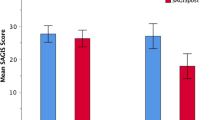Abstract
Functional gastrointestinal disorders (FGID) can benefit from various psychological interventions. The main objective here was to define the contribution of a new psychotherapeutic intervention, group counseling psychotherapy, for the management of FGID patients. Secondary aims included validation of new measures for gastrointestinal symptoms and quality of life in patients with FGID. Fifty patients seen in a tertiary care center were included in a program of 10 weekly sessions of 2 hr each. Gastrointestinal symptoms, quality of life, and psychological conditions were measured before and after treatment by quantitative indices and by qualitative self-analysis. Gastrointestinal index and quality-of-life index were significantly (P < 0.02) improved at the end of the psychotherapeutic intervention (from 77.5 ± 4.0 to 63.2 ± 4.3 and from 67.7 ± 3.9 to 54.9 ± 3.9, respectively). In a control group of patients observed for a comparable period of time while waiting for the psychotherapy program, gastrointestinal and quality of life indices remained unchanged. The severity of gastrointestinal symptoms and the quality of life deterioration were highly correlated factors (r = 0.8) at entry into the trial, and their improvement with psychotherapy was also correlated (r = 0.6; P < 0.001). Psychological abnormalities were frequent in these patients (anxiety in 31%, somatization in 29%, depression in 26% of the patients). However, no specific disorder could predict the results of the psychotherapeutic intervention. Over the long term (6–24 months after conclusion of treatment), gastrointestinal status, quality of life, and psychological condition were estimated as improved by 53%, 63%, and 67% of the patients, respectively. The gastrointestinal index and quality of life index we developed were validated to detect the disease and to follow its evolution in response to treatment. In conclusion, group counseling psychotherapy offered a significant contribution for the management, improving gastrointestinal symptoms and quality of life, of FGID patients. New measures for symptom severity and quality of life are available.
Similar content being viewed by others
REFERENCES
Drossman DA, Whitehead WE, Camilleri M: Irritable bowel syndrome: A technical review of practice guideline development. Gastroenterology 112:2120–2137, 1997
Drossman DA, Creed FH, Olden KW, Svedlund J, Toner BB, Whitehead WE: Psychosocial aspect of the functional gastrointestinal disorder. Gut 45(suppl II):1125–1130, 1999
Blanchard EB: Irritable bowel syndrome. In Psychophysiological Disorders. RJ Gatchel, EB Blanchard (eds). Washington, DC, American Psychological Association 1993, pp 23–62
Whorwell PJ, Prior A, Faragher EB. Controlled trial of hypnotherapy in the treatment of severe refractory irritable bowel syndrome. Lancet 2:1232–1234, 1984
Guthrie E, Creed F, Dawson D, Tomenson B. A controlled trial of psychological treatment for the irritable bowel syndrome. Gastroenterology 100:450–457, 1991
Svedlund J: Psychotherapy in irritable bowel syndrome: A controlled outcome study: Acta Psychiatri Scand 67:Suppl 306:1–86, 1983
Thompson WG, Creed F, Drossman DA, Heaton KW, Mazzacca G. Functional bowel disease and functional abdominal pain. Gastroenterol int 5(2):75–91, 1992
Huet PM, Deslauriers J, Tran A, Faucher C, Charbonneau J: Impact of fatigue on the quality of life of patients with primary biliary cirrhosis. Am J Gastroenterol 95:760–767, 2000
Rogers C: Counseling and psychotherapy. Boston, Houghton Mifflin, 1970
Portelance C: Relation d'aide et amour de soi. Les éditions du CRAM, Montréal, 1990
Francis CY, Morris J, Whorwell PJ: The irritable bowel severity scoring system: A simple method of monitoring irritable bowel syndrome and its progress. Aliment Pharmacol Ther 11(2):395–402, 1997
Patrick DL, Drossman DA, Frederick IO, DiCesare J, Puder KL: Quality of life in persons with irritable bowel syndrome: Development and validation of a new measure. Dig Dis Sci 43(2):400–411, 1998
Drossman DA, Patrick DL, Whitehead WE, Toner BB, Diamant NE, Hu Y, Jia H, Bangdiwala SI: Further validation of the IBS-QOL: A disease-specific quality-of-life questionnaire. Am J Gastroenterol 95(4):999–1007, 2000
Bland JM, Altman DG: Comparing methods of measurement: Why plotting difference against standard method is misleading. Lancet 346:1085–1087, 1995
Hamilton J, Guthrie E, Creed F, Thompson D, Tomenson B, Bennett R, Moriarty K, Stephens W, Liston R: A randomized controlled trial of psychotherapy in patients with chronic functional dyspepsia. Gastroenterology 119(3):661–669, 2000
Talley NJ, Owen BK, Boyce P, Paterson K: Psychological treatments for Irritable Bowel Syndrome: A critique of controlled treatment trials: Am J Gastroenterol 91(2):277–286, 1996
Colwell LJ, Prather CM, Phillips SF, Zinsmeister AR: Effects of an irritable bowel syndrome educational class on healthpromoting behaviors and symptoms. Am J Gastroenterol 93(6):901–905, 1998
Poitras P, Riberdy-Poitras M, Plourde V, Boivin M, Verrier P: Evolution of visceral sensitivity in patients with IBS. Dig Dis Sci (in press)
Mertz H, Naliboff B, Munakata J, Niazi N, Mayer EA: Altered rectal perception is a biological marker of patients with irritable bowel syndrome. Gastroenterology 109:40–52, 1995
Author information
Authors and Affiliations
Rights and permissions
About this article
Cite this article
Poitras, M.R., Verrier, P., So, C. et al. Group Counseling Psychotherapy for Patients with Functional Gastrointestinal Disorders: Development of New Measures for Symptom Severity and Quality of Life. Dig Dis Sci 47, 1297–1307 (2002). https://doi.org/10.1023/A:1015370430477
Issue Date:
DOI: https://doi.org/10.1023/A:1015370430477



